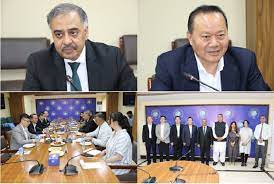CPSC, ISSI host Xinjiang delegation, discuss decade of CPEC and other matters

Islamabad: The China-Pakistan Study Centre (CPSC) at the Institute of Strategic Studies Islamabad (ISSI) has hosted a four-member Chinese delegation led by Yuan Jianmin, Counsellor of Xinjiang Autonomous Region Government.
The delegation also included Liu Zongyi, Secretary of China South Asian Study Centre, Shanghai Institute of International Studies; Wang Shida, Deputy Director of South Asia Studies, China Institute of Contemporary International Relations (CICIR); and Li Jingfeng, Associate Professor, Sichuan Academy of Social Science.
During the meeting, they discussed various topics such as the evolving global environment, developments in major-power relations, the impact of the ‘Indo-Pacific’ strategy on South Asia, achievements during the ‘Decade of CPEC’, and the importance of the Pakistan China All-weather Strategic Cooperative Partnership in international dynamics.
Director General (DG) ISSI Ambassador Sohail Mahmood welcomed the visiting scholars and emphasized the significance of Pakistan-China relations in the contemporary world, highlighting the strategic importance of the China-Pakistan Economic Corridor (CPEC) for Pakistan’s economic transformation and regional prosperity.
He also shared Pakistan’s perspective on major-power competition and the implications of designating a South Asian state as a ‘net security provider’.
Dr Talat Shabbir, Director CPSC, briefed the Chinese delegation about the structure and functioning of ISSI, mentioning recent events organized by CPSC and upcoming activities. He emphasized the importance of joint seminars held between ISSI-CICIR and ISSI-Fudan University in China, underscoring their pivotal role in enhancing China-Pakistan bilateral relations.
The Chinese delegates expressed their acknowledgment of the strategic importance of China-Pakistan relations, emphasized the significance of the next phase of CPEC, stressed the need for deepening people-to-people contacts, particularly among the youth, and pledged to strengthen institutional relationships between the think-tanks of both countries.





